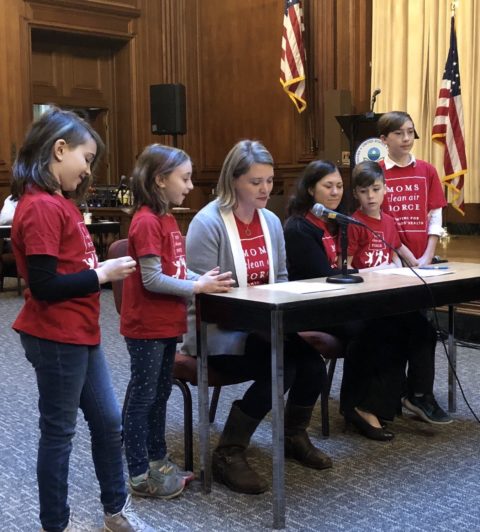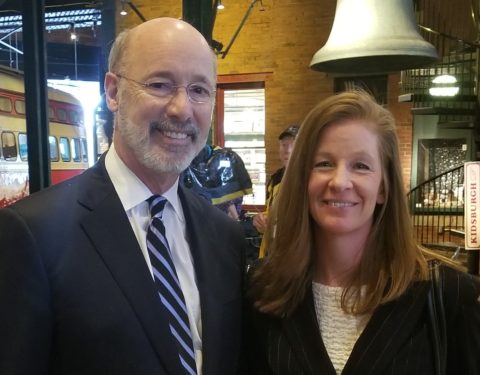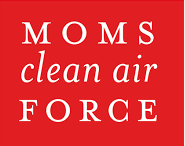Energy Foundation made its first grant to Moms Clean Air Force in 2016.
Patrice Tomchik and Mollie Michel are two moms working to hold the gas industry accountable in Pennsylvania, along with an army of concerned parents and kids.

Patrice Tomcik first got involved with Moms Clean Air Force when her young son was battling cancer in their southwestern Pennsylvania community. “My son’s cancer opened my eyes to how the environment can affect health. Then fracking came to my community. We learned that a gas well pad was being built a half mile from my son’s school. I found other parents who were just as concerned as I was. So I got involved to protect my children.” Since joining Moms Clean Air Force in 2015, Patrice has become a project manager working on climate change solutions with the organization.
Like Patrice, Mollie Michel is a mother of two and active in Moms Clean Air Force as a field consultant. After moving to Philadelphia, she kept noticing poor-air alerts. “When we moved to Philly, I started noticing air quality alerts constantly. My children don’t have asthma, but I started reading about the Philly asthma rate and how it’s above the national average. I’m constantly aware of pollution here.”
Moms Clean Air Force brings the voices of more than 1.2 million parents nationally to decision-makers at the local, regional, and national levels. They have state chapters in 18 states with the mission to build support for standards that limit climate pollution from carbon, methane, and ozone to protect our children’s health. Their resources for adults are designed to empower moms, dads, grandparents, and a generation too young to vote.
“What we do is we give parents and kids actions they can take,” said Patrice. “For Valentine’s Day, we take letters and artwork from our kids into legislators. We bring our children to visits with policymakers and to rallies, and trace their hands on posters with messages to protect children’s health from air pollution. We don’t want anyone to feel helpless, and so we’re all about solutions.”
By now, images of tap water catching fire in Pennsylvania have become synonymous with a natural gas extraction process called “fracking.” Sitting atop the extensive Marcellus Shale deposit, Pennsylvania is the nation’s second-largest gas producer. Threats to drinking water, air pollution, and safety are challenging the state as it grapples with 11,000 gas wells currently in production. What is extracted in Patrice’s community is sent to cities, like Philadelphia, and across the country, for heating, cooking, electricity, and sometimes fuel for vehicles.
In the course of drilling, operating, and maintaining thousands of gas wells across Pennsylvania, methane leaks happen, costing “nearly $68 million worth of wasted energy.” Exposure to oil and gas extraction can cause health problems ranging from headaches to an increased chance of developing cancer, affecting everyone. Climate concerns are equally grave as methane is 30 times more potent, or more harmful, to our environment than carbon dioxide. Locating and stopping methane leaks is critical if gas extraction continues in the U.S.
Working with groups like Clean Air Council, PennFuture, Evangelical Environmental Network, Sierra Club, and Environmental Defense Fund, Moms Clean Air Force is teaching the next generation of advocates how to fight for what’s right, and how to make their voices heard. “We don’t do this work alone,” said Patrice. “What I love about this work is that we can all have a slightly different mission, yet all be working toward the shared goal of methane reduction. We are all representing different communities, with different interests and voices on a shared cause.”
These groups and others have been actively involved in advocating for health-protective gas standards for new, modified, and existing gas production. Last year, Pennsylvania’s Department of Environmental Protection finalized ambitious standards for new and modified wells that will reduce methane and VOC (volatile organic compound) pollution. The recently released draft existing well standards unfortunately aren’t as ambitious and are in need of strengthening, specifically directly regulating methane, not only VOCs.

Governor Tom Wolf has recently made some exciting climate commitments. He recently announced that Pennsylvania will join the U.S. Climate Alliance, a bipartisan coalition of 24 governors, representing over half of the U.S. population to work to implement policies that uphold the commitments our nation made in the Paris Agreement, and released a Climate Action Plan. This recent action complements his commitment made earlier this year, to reduce greenhouse gases in the state 26 percent by 2025 and 80 percent by 2050. “Setting the goals is the first step,” says Mollie. “Enacting the policies to achieve those goals is where we’re headed next.”
“We have a lot of work to do, but it’s moving,” says Patrice. “Most states in the Northeast, from Maine to Virginia, have a binding and declining limit on carbon pollution,” referring to the Regional Greenhouse Gas Inventory, the nation’s first mandatory market-based program in the U.S. to reduce greenhouse gas emissions. “It is time to do the same in Pennsylvania. This is an opportunity to enact a flexible, market-based solution to achieve these limits and the ambitious climate goals the governor has set, at the lowest cost.”
The policies Pennsylvania chooses will set the stage for the state’s energy future and its ability to meet or exceed the goals that Governor Wolf has set forth.
“I would love for my kids not to be fighting this issue when they are adults,” says Mollie. “I’d love for them to be fighting for some other issue. I want us to tackle this problem in a comprehensive way, at all levels of government. It is my dream that once they graduate college, they have something else to focus on.”


